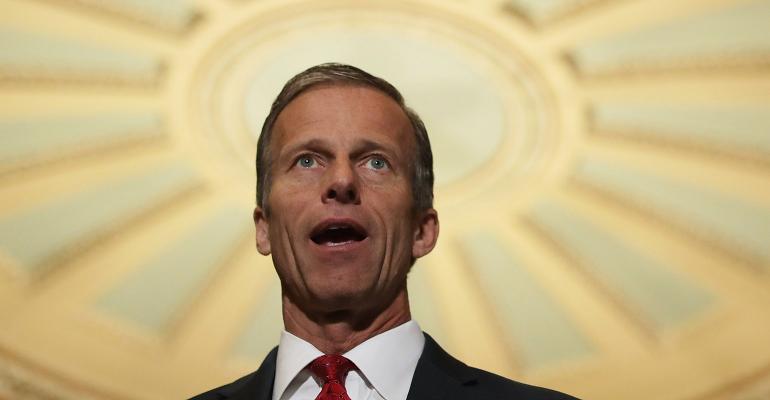For the first time in 17 years, and just in time for the “Super Bowl of Tax,” Senate Republicans will have a new leader in Sen. John Thune (R-S.D.). Thune won the support of his colleagues last week after Sen. Mitch McConnell (R-Ky.) stepped down from the party’s helm. It’s tough to imagine a lawmaker better prepared to hit the ground running.
Thune has served as the chamber’s No. 2 Republican since 2019 and was among the “core four” tax writers who drafted the 2017 Tax Cuts and Jobs Act (TCJA) when Republicans controlled both chambers of Congress and the White House. Thune will have an opportunity to immediately draw on his experience in navigating the minutiae of Senate procedure and getting GOP priorities across the finish line.
The Constitution requires tax policymaking to begin in the House. However, under one-party government control, the Senate’s rules will play an essential role in shaping tax legislation next year.
That’s because Republicans are preparing to bypass the chamber’s filibuster rules and avoid having to strike a deal with Democrats by pursuing tax reform via the budget reconciliation process. This plan mirrors how the GOP pursued tax reform in 2017, in which Thune had a front-row seat as the party’s number three. Thune’s background could make navigating the chamber’s arcane reconciliation rules easier, potentially allowing Congress to send a tax bill to President Trump’s desk more quickly.
Setting the Senate’s schedule early next year could nevertheless prove tricky. Thune will also be juggling nomination hearings and votes to staff up a second Trump Administration, and we’ve already seen the President-elect float names to fill cabinet positions who face a complicated path toward being confirmed.
Thune and President-elect Donald Trump have had a frosty relationship at times, with Trump going as far as calling for a primary challenge to Thune in 2020. How the next majority leader handles his relationship with the White House, especially if Trump attempts to directly influence what is and isn’t included in a big tax bill next year, could significantly speed up or slow down the tax-writing process.
Thune’s Priorities
As for his own priorities, Thune has developed a reputation as a measured negotiator who favors pro-growth tax policies. He was the chief architect of the portion of TCJA that changed how pass-through entities are taxed and supports preserving policies like stepped-up basis at death, taxing carried interest as capital gains and eliminating the estate tax.
It remains unclear how aggressively Senate Republicans might try to offset the cost of extending or building upon their 2017 tax cuts. Thune could find some revenue by limiting state and local tax deductions, but broadly speaking, he and his Republican colleagues in the Senate seem less interested than House Republicans in offsetting as much of the cost of extending and expanding on the TCJA.
Thune’s biggest challenge could very well be a less-than-predictable White House agenda, where priorities sometimes enter and leave the conversation as fast as social media posts on a feed. Time will tell if Thune and his leadership team can keep their footing as a second Trump Administration steers our ship of state in 2025 and beyond.
Elias Vetter contributed to this article.





